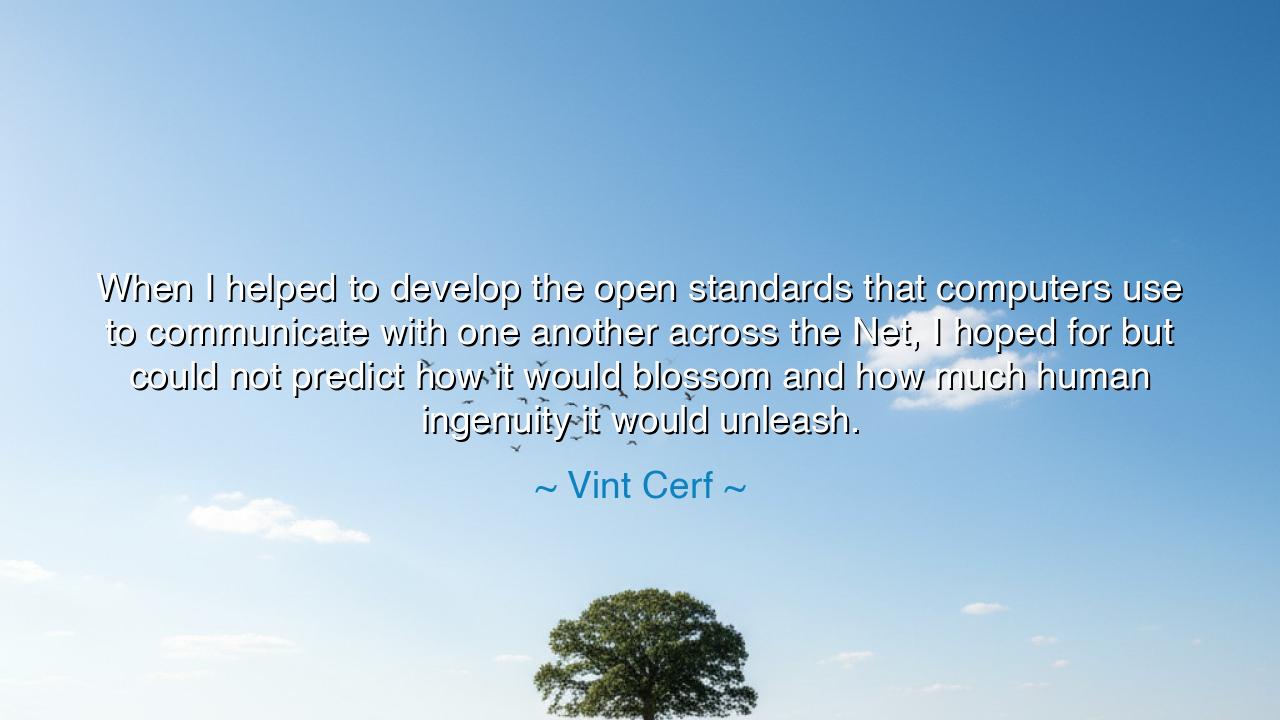
When I helped to develop the open standards that computers use to
When I helped to develop the open standards that computers use to communicate with one another across the Net, I hoped for but could not predict how it would blossom and how much human ingenuity it would unleash.






"When I helped to develop the open standards that computers use to communicate with one another across the Net, I hoped for but could not predict how it would blossom and how much human ingenuity it would unleash." These words, spoken by the visionary Vint Cerf, reflect both the humility and foresight of a man who played a key role in shaping the digital age. As one of the fathers of the Internet, Cerf speaks not only of his own contributions but of the transformative power of open standards, those foundational principles that allow computers to communicate freely and seamlessly across the globe. His words remind us of the unpredictable nature of progress, and the unforeseen ways in which human creativity can build upon the simplest of ideas to bring about revolutionary change.
In the ancient world, the seeds of change were often planted with a single vision—a thought that could scarcely be imagined in the minds of others, yet which carried within it the potential for great transformation. The Greeks, with their philosophers and inventors, understood that knowledge was not merely for the present but for the future. Archimedes, with his principle of buoyancy, could not have known how his discovery would inspire centuries of scientific progress. Similarly, Pythagoras, with his insights into the nature of numbers, set in motion a chain of events that would lead to advances in mathematics, architecture, and physics. In much the same way, Cerf’s creation of the open standards for the Internet was a spark—seemingly small, but destined to ignite the boundless power of human innovation.
Vint Cerf and his colleagues could not have foreseen the explosion of human ingenuity that would follow the development of the Internet, for their vision was rooted in the practicality of making computers communicate efficiently. Yet, just as the ancient philosophers sought to unlock the mysteries of the world through their wisdom, the architects of the digital age opened a doorway to a realm where ideas could spread across the world in an instant. With the creation of the Internet, humanity gained a tool far beyond any one individual's capacity for understanding. It became a living organism, growing and evolving in ways that no one could predict.
Consider the story of Gutenberg’s printing press, an invention that, like the Internet, revolutionized the world. Johannes Gutenberg did not imagine the vast cultural and societal shifts his press would trigger. He could not predict the Reformation, the spread of the Renaissance, or the acceleration of scientific discovery. Yet, in creating the press, Gutenberg unlocked a torrent of human ingenuity—ideas once confined to the elite were suddenly in the hands of the many, and with that came the potential for untold progress. Similarly, Cerf’s work with open standards paved the way for a global community of creators, thinkers, and innovators to build upon his foundation, far surpassing his original intentions.
As Cerf humbly reflects, the open standards he helped establish have become the very framework of a new era—one where information flows freely, where knowledge is shared without barriers, and where collaboration knows no boundaries. The Internet has become a tool for empowerment, allowing individuals from all corners of the earth to connect, to innovate, and to shape the world in ways that were once unimaginable. From the humble beginnings of computer communication, it has blossomed into a force that touches every aspect of modern life—from business to education, from art to social movements. It is a testament to the power of ideas, and to the unpredictable potential that lies within the seeds of innovation.
The lesson that Cerf’s words impart is one of vision, humility, and gratitude. We may never fully understand the extent to which our actions today will affect the future. Yet, just as Cerf’s open standards sparked a global renaissance in technology and creativity, so too can our ideas—whether large or small—create ripples that change the world. The lesson for us all is clear: embrace innovation, no matter how uncertain its outcome, for it is often in the unpredictable that true greatness lies. Like the builders of the ancient world, we must dare to dream, to create the structures of tomorrow, knowing that the impact of our work may unfold in ways we can scarcely imagine.
In our own lives, we are called to be both visionaries and builders, laying the foundations for the future with integrity and purpose. We may not always see the fruits of our labor in our lifetimes, but the seeds we plant today can blossom in ways that benefit generations to come. Let us then take Cerf’s words to heart, and continue to create, to collaborate, and to innovate—not for the promise of immediate reward, but for the hope that our work will inspire the boundless ingenuity of those who follow. In this, we will leave a legacy that shapes the course of history.






AAdministratorAdministrator
Welcome, honored guests. Please leave a comment, we will respond soon